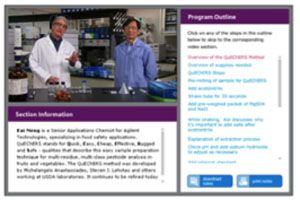See Agilent SampliQ QuEChERS Kits in Action!
QuEChERS is the fast, proven method to prepare food for pesticide analysis. Now it's easier than ever to start using it in your lab!

Multi-class, multi-residue pesticide analysis with new Agilent SampliQ QuEChERS Kits.
The QuEChERS (pronounced “catchers”) method saves food safety labs time and money. QuEChERS is the fast, proven method to prepare food for multi-residue, multi-class pesticide analysis. And it sure lives up to the name Quick, Easy, Cheap, Effective, Rugged and Safe.
Now, it’s easier than ever for you to start taking advantage of the QuEChERS method. New Agilent SampliQ QuEChERS Kits simplify the QuEChERS method, making it even easier and more reliable. Pre-packed Extraction Kits and Dispersive SPE Kits suit specific food types and screening protocols.
Extraction Kits contain pre-weighed salts in anhydrous packets, so you can add them after the acetonitrile, protecting the integrity of your sample.
Dispersive SPE Kits are assembled in 2 mL and 15 mL sizes, pre-weighed and pre-mixed with just the right mix of salts and sorbents for your aliquot volume.
Agilent’s tight quality control processes ensure that all QuEChERS salts, solvents and supplies are high quality and free of contaminants, so your results are accurate and reproducible. View the QuEChERS video demo. You’ll also be able to request a sample and take advantage of special purchase offers.
*QuEChERS was developed by M. Anastassiades, S. J. Lehotay, D. Stajnbahar, F.J. Schenck. J. AOAC International 86, p. 412 – 431 (2003).
Best of the Week: Food Analysis, Chemical Migration in Plastic Bottles, STEM Researcher of the Year
December 20th 2024Top articles published this week include the launch of our “From Lab to Table” content series, a Q&A interview about using liquid chromatography–high-resolution mass spectrometry (LC–HRMS) to assess chemical hazards in plastic bottles, and a piece recognizing Brett Paull for being named Tasmanian STEM Researcher of the Year.
Using LC-MS/MS to Measure Testosterone in Dried Blood Spots
December 19th 2024Testosterone measurements are typically performed using serum or plasma, but this presents several logistical challenges, especially for sample collection, storage, and transport. In a recently published article, Yehudah Gruenstein of the University of Miami explored key insights gained from dried blood spot assay validation for testosterone measurement.
Determination of Pharmaceuticals by Capillary HPLC-MS/MS (Dec 2024)
December 19th 2024This application note demonstrates the use of a compact portable capillary liquid chromatograph, the Axcend Focus LC, coupled to an Agilent Ultivo triple quadrupole mass spectrometer for quantitative analysis of pharmaceutical drugs in model aqueous samples.